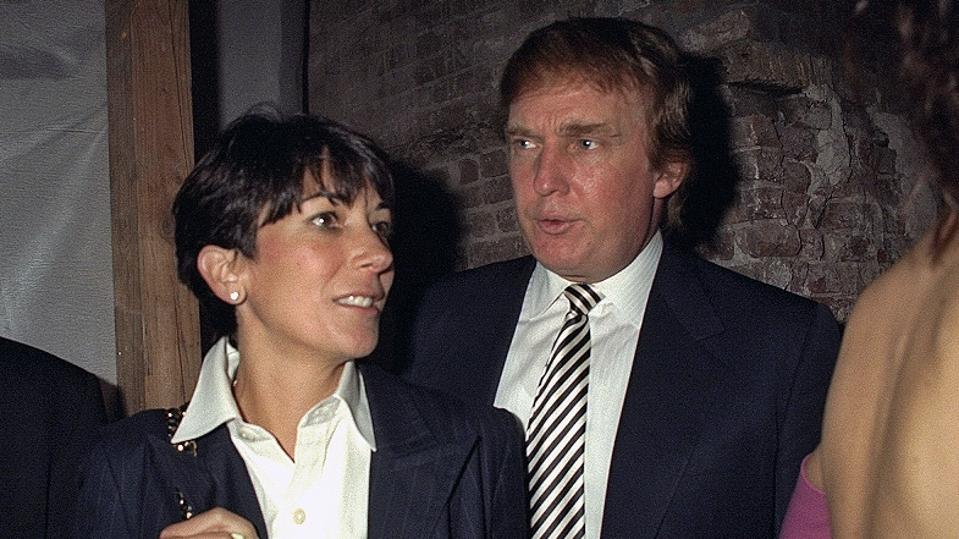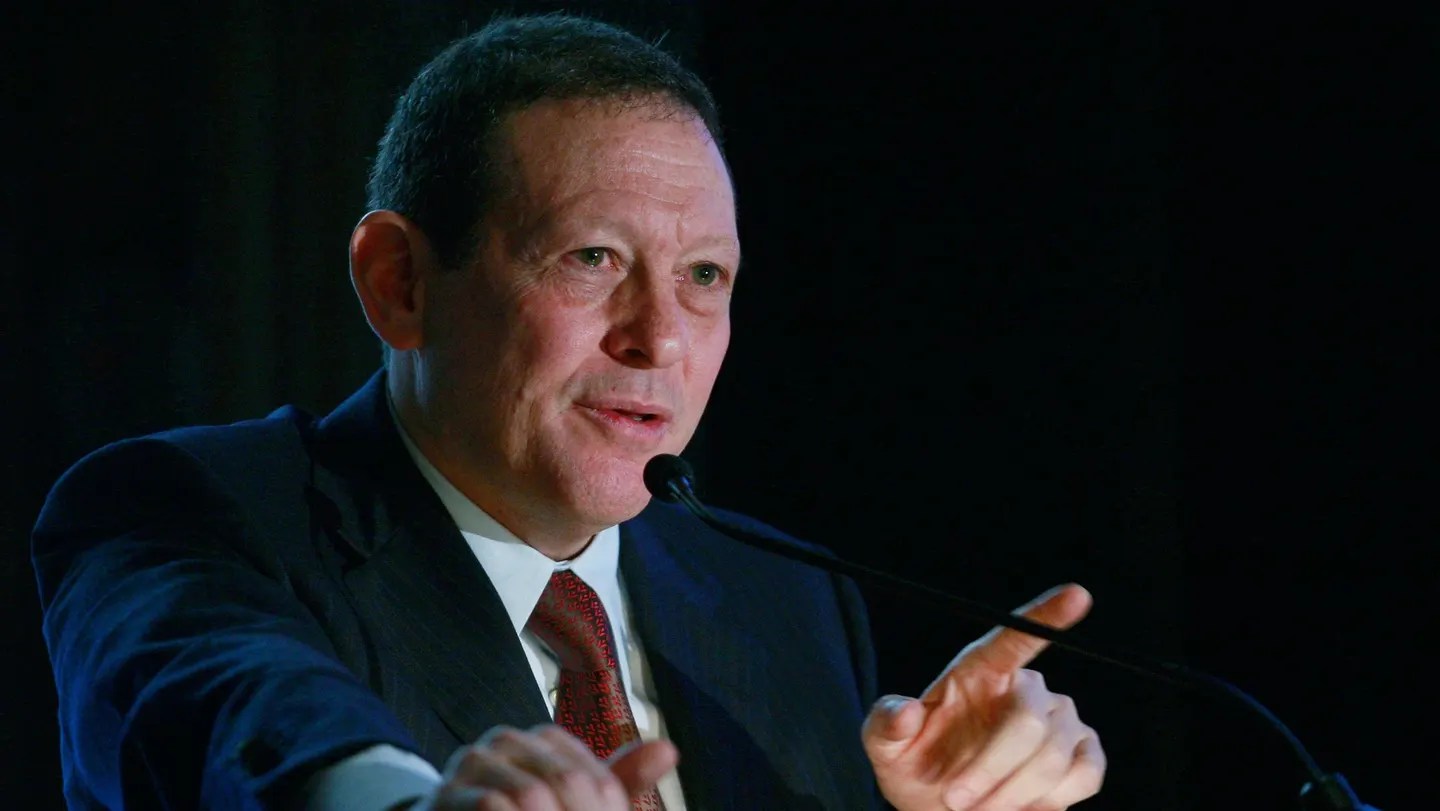President Donald Trump did not rule out the possibility of pardoning Jeffrey Epstein associate Ghislaine Maxwell on Friday—saying he hadn’t “thought about” the possibility but is “allowed” to pardon her—as Maxwell’s interview with Justice Department prosecutors this week has sparked new questions about whether the Trump administration could offer her a pardon in exchange for exonerating the president from Epstein’s crimes.

Ghislaine Maxwell and now-President Donald Trump attend the 50th Anniversary of the Ford Modeling Agency in New York City on Oct. 30, 1997.
NY Daily News via Getty Images
Key Takeaways
- Trump was asked about the possibility of pardoning Maxwell as she enters her second day of questioning by the DOJ and Deputy Attorney General Todd Blanche.
- Maxwell is serving a 20-year prison sentence after being convicted on charges of sex trafficking and transporting minors to participate in illegal sex acts, stemming from her role in Epstein’s alleged sexual abuse.
- Trump told reporters he “hadn’t thought about” pardoning Maxwell or commuting her sentence, adding, “I’m allowed to do it, but it’s something I have not thought about.”
- The president did not respond to a follow up question asking if that meant he had not ruled out the possibility of pardoning Maxwell.
- The DOJ’s interview with Maxwell has sparked criticism that it could tee up a potential pardon, as legal experts speculate the Epstein associate has little reason to speak with prosecutors unless it could benefit her case.
- Legal analysts have suggested the Trump administration could pardon Maxwell in exchange for testimony that’s favorable to Trump, with former Watergate prosecutor Nick Akerman telling CNN prosecutors are hoping Maxwell “will be motivated to say that Donald Trump didn’t know what Jeffrey Epstein was up to with underage girls and they never participated in that.”
What To Watch For
The DOJ is interviewing Maxwell for a second day Friday at a courthouse in Tallahassee, Florida. Prosecutors have so far not given any indication to suggest how much information they’ll release from the interview, or whether any recordings or transcript could be released, with Blanche only saying Thursday, “The Department of Justice will share additional information about what we learned at the appropriate time.”
What Has Trump Said About Ghislaine Maxwell?
Trump has not been accused of any misconduct in connection with Epstein, but is well known to have been friends with the financier from the 1980s through the early 2000s. The president was also known to frequently socialize with Maxwell during that time, appearing in numerous photos with her, and Trump said after her 2020 arrest, “I wish her well.” “I’ve met her numerous times over the years, especially since I lived in Palm Beach,” Trump said at that time. Epstein’s former business partner Steven Hoffenberg also told The Washington Post in 2019 that Trump “was crazy about Maxwell, a very charming lady.”
Will Trump Pardon Ghislaine Maxwell?
It’s still unclear. The White House had previously denied any suggestion that it would pardon the Epstein associate, with an unnamed official telling The New York Post last week, “There have been no discussions or consideration of a pardon for Ghislaine Maxwell, and there never will be.” Rep. James Comer, R-Ky., also told CNN the House Oversight Committee, which voted to subpoena Maxwell for testimony, also would not float trying to get her pardoned in exchange for speaking with lawmakers, saying that was “off the table” because “I don’t think any Republican would support that.” It remains to be seen if the White House could change course and ultimately grant Maxwell a pardon based on her testimony, however, and legal experts have speculated that Blanche conducting her interview, rather than a lower-ranking attorney, could suggest the administration is interested in a bigger negotiation.
“This is extremely unusual,” Akerman told CNN, arguing Blanche’s position as Trump’s former personal defense attorney suggests “they’re hoping that Maxwell wants a pardon from Donald Trump.” Maxwell’s attorney David Oscar Markus said Thursday that Maxwell cooperated with prosecutors during the first day of her interview and she “answered every single question.” “She never stopped, she never invoked a privilege, she never declined to answer,” Markus added. The attorney has not said explicitly whether Maxwell is seeking a pardon or any other sort of leniency from the president, but Markus has repeatedly praised the Trump administration in statements about Maxwell’s interview, saying Thursday, “We are grateful that the government is trying to uncover the truth.”
Chief Critic
Attorney Bradley Edwards, who represents a number of Epstein victims, told MSNBC on Wednesday that clients of his have repeatedly asked whether Trump could pardon Maxwell. “And I say, ‘Look, I know you feel like an afterthought right now, I know you feel like you don’t matter. For him to do that would be—he thought about you and he decided you do not matter.’ I don’t think that is on the table. I don’t think he would ever do that,” Edwards said, though he acknowledged he may be “putting too much trust in him.” “But either way, if he’s not going to do that, what incentive does [Maxwell] have to tell him anything, if she’s getting nothing out of it?”
How Else Could The Trump Administration Benefit Ghislaine Maxwell?
If Trump doesn’t pardon her entirely, the Trump administration could also try to reduce Maxwell’s prison sentence under what’s known as a “Rule 35 motion.” That process allows prosecutors to request the court reduce a defendant’s sentence because of actions they took post-sentencing, such as providing “substantial assistance” to the government in a different prosecution. That means if Maxwell were to provide information about other Epstein associates who are implicated in his alleged crimes, the Trump administration could seek to get her out of prison sooner in exchange.
Can Ghislaine Maxwell’s Testimony Be Trusted?
Legal experts have raised issues with Maxwell’s testimony to the DOJ, since she could use it for her own personal gain. “There’s no way you could ever believe Maxwell by virtue of the fact that she’s got every motive to say whatever she wants in order to get that pardon,” Akerman told CNN. Experts have also pointed to her history of allegedly lying under oath, as prosecutors initially charged Maxwell with perjury when she was indicted in 2020, based on her comments in a 2016 deposition about Epstein.
Maxwell was never tried on those charges, however, because they were separated from the sex trafficking charges she was convicted of before her trial, and prosecutors then offered to drop the charges afterwards. That wasn’t because they didn’t believe she committed perjury, but was rather used as a negotiating tactic to ensure the harsher sex trafficking conviction stayed in place as Maxwell sought a new trial, with prosecutors also saying they wanted to spare Epstein’s victims from having to go through a second trial. “We’re going to go and ask somebody to tell the truth who was indicted on perjury charges on this particular topic?” Edwards told MSNBC. Markus has insisted that his client’s comments to the DOJ will be truthful, saying Friday that Maxwell had been “treated very unfairly” and did not have reason to lie, NBC News reports.
Key Background
Maxwell is believed to be Epstein’s primary accomplice in his alleged sex trafficking scheme, with the British socialite convicted based on accusations that she helped recruit women for Epstein and took part in his alleged abuse. Epstein later died in prison in 2019 after being indicted on sex trafficking charges, with Maxwell indicted a year later in 2020. Her interview with DOJ comes as public interest in the Epstein case has surged in recent weeks, following the DOJ’s decision not to release any further Epstein files. Prosecutors have so far resisted releasing any files in response to the public outcry over their decision, but announced they would seek an interview with Maxwell about Epstein’s associates.


